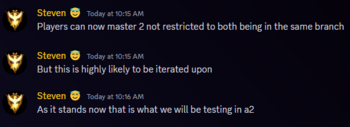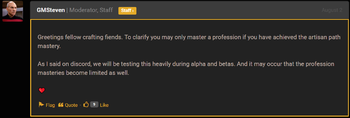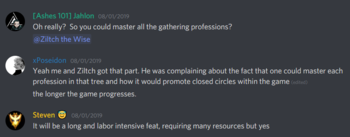Artisan certification quests
Ambachtelijke vooruitgang within each profession requires the completion of certification quests.[1]
- We're planning on having some content related to onboarding players to the different professions; and you're going to need a tool for the first time; and you're going to want to craft a thing for the first time; and learn how to do those things. But, we also want to extend that out to more of a individual story-arc-like experience for players. So, as you as you become a better Lumberjack you'll play out your story as as a lumberjack: so these different certification quests are to be keystone moments in that story progression.[1] – Kory Rice
- There are limits to the number of professions at each certification tier across the three artisan branches.[2][3][4][5]
- Achieving an artisan certification in a profession also implies that the character also achieved any lower-tier certifications up to that point.[6]
List of artisan certification quests
| Quest | Location | Quest giver | Steps | XP | Currency |
|---|---|---|---|---|---|
| We Rise after Felling | Woodshops | Master Woodcutter | 1 | 0 |
Ambachtelijke vooruitgang
Ambachtsklassen staan niet toe dat een character een meester in alles kan worden.[7] Een speler moet voor elk character een pad kiezen in de ambachtsvaardigheidsboom.[8] Het vertakken in specifieke paden staat de speler toe om zich te specialiseren in bepaalde vakgebieden. Dit moedigt een spelers inderdependentie aan, wat op zijn beurt de ambachtservaring verrijkt.[9]
- Beroepskeuze heeft geen effect op de statistieken van een speler.[10]
- Characters binnen een account, ofwel alts, mogen verschillende beroepen hebben.[7]
Wanneer we refereren naar het niet-zijn van meesters van alles, betekent dat niet dat je geen meester kunt zijn binnen jouw eigen ambachtstype. Dit type kan maker, verzamelaar of verwerker zijn. Je zult een meester zijn van een van die drie, je zult geen meester zijn van de andere twee.[11] – Steven Sharif
Artisan mastery
A character may only ever be a Master in up to 3 professions and Grandmaster in up to 2 professions across all artisan branches.[2][3]
- Artisan mastery is no longer restricted to a single branch.[3]
- Characters may change which professions they master.[12]
- Becoming a master Crafter or a master Processor or a master Gatherer should be a significant time investment and resource investment; and because of that it should also be something that when you achieve that status it's like people on the server know who you are.[13] – Steven Sharif
- Masteries aren’t just about making an item. They grant many things, including titles, access to items, bargains, and quests. [14]
- Previously it was stated that with considerable effort a player can master all professions within a mastered parent artisan class.[15][16] This was later changed to a player being able to master some but not all professions within a mastered parent artisan class.[17][8] This was changed to being able to master up to two or three professions within a mastered parent artisan class (subject to testing).[18] This was changed to being able to master up to two professions.[19] The current stance is only being able to become a Master of 3 professions and Grandmaster of 2 professions across all branches.[2][3]
- Q: What would be the daily activities for someone at level 50 with a maxed out artisan tree?
- A: The daily activity might be something along the lines of, depending on what type of profession or processor you are, of interacting with fellow artisanship individuals to wheel and deal on supply and demand chains; orchestrating and participating and caravan roads that move materials across the world so that you can satisfy buy orders and/or commission requests. Participating in unique trades and/or dungeon experiences that have the opportunity to acquire unique crafting materials so that you can create the dragon's legendary sword and sell that potentially. Finding unique harvestable materials in remote parts of the world or engaging in treasure map finding for again unique materials and/or processing things. There's a whole host of different intents that are loops for the players to participate in that again are situationally relevant based on the world state.[20] – Steven Sharif
Zie ook
Referenties
- ↑ 1.0 1.1 Video, 2023-11-30 (16:40).
- ↑ 2.0 2.1 2.2

- ↑ 3.0 3.1 3.2 3.3

- ↑

- ↑

- ↑

- ↑ 7.0 7.1 Livestream, 24 mei 2017 (32:07).
- ↑ 8.0 8.1

- ↑ Livestream, 5 mei 2017 (6:12).
- ↑ Livestream, 2024-07-18 (37:25).
- ↑ Livestream, 2024-07-26 (1:09:46).
- ↑

- ↑ Interview, 2020-07-20 (18:47).
- ↑

- ↑

- ↑

- ↑

- ↑ Livestream, 2022-04-29 (1:13:00).
- ↑

- ↑ Interview, 2023-07-09 (42:51).